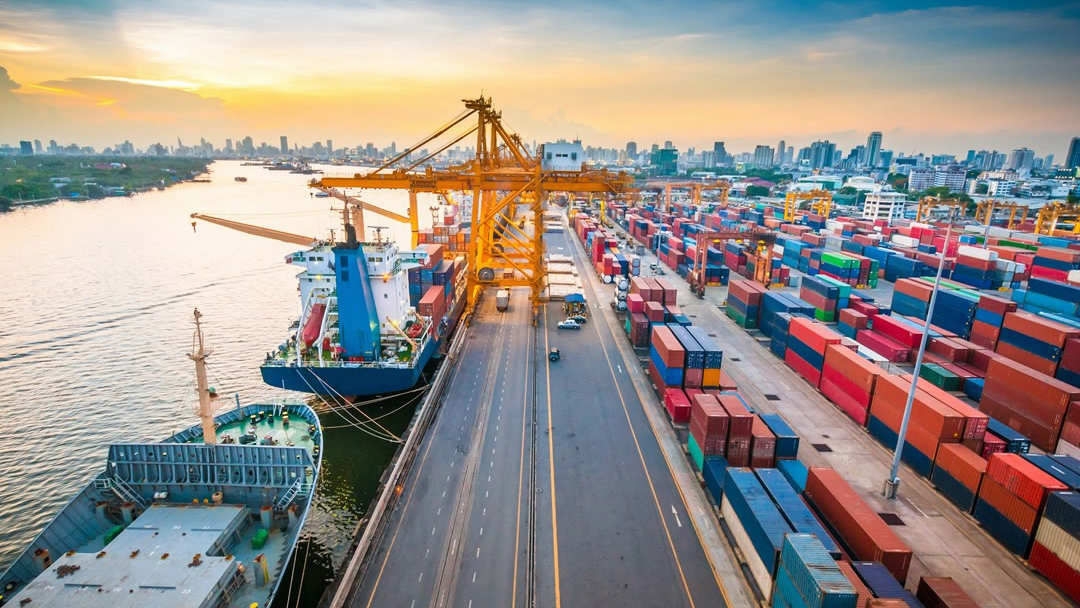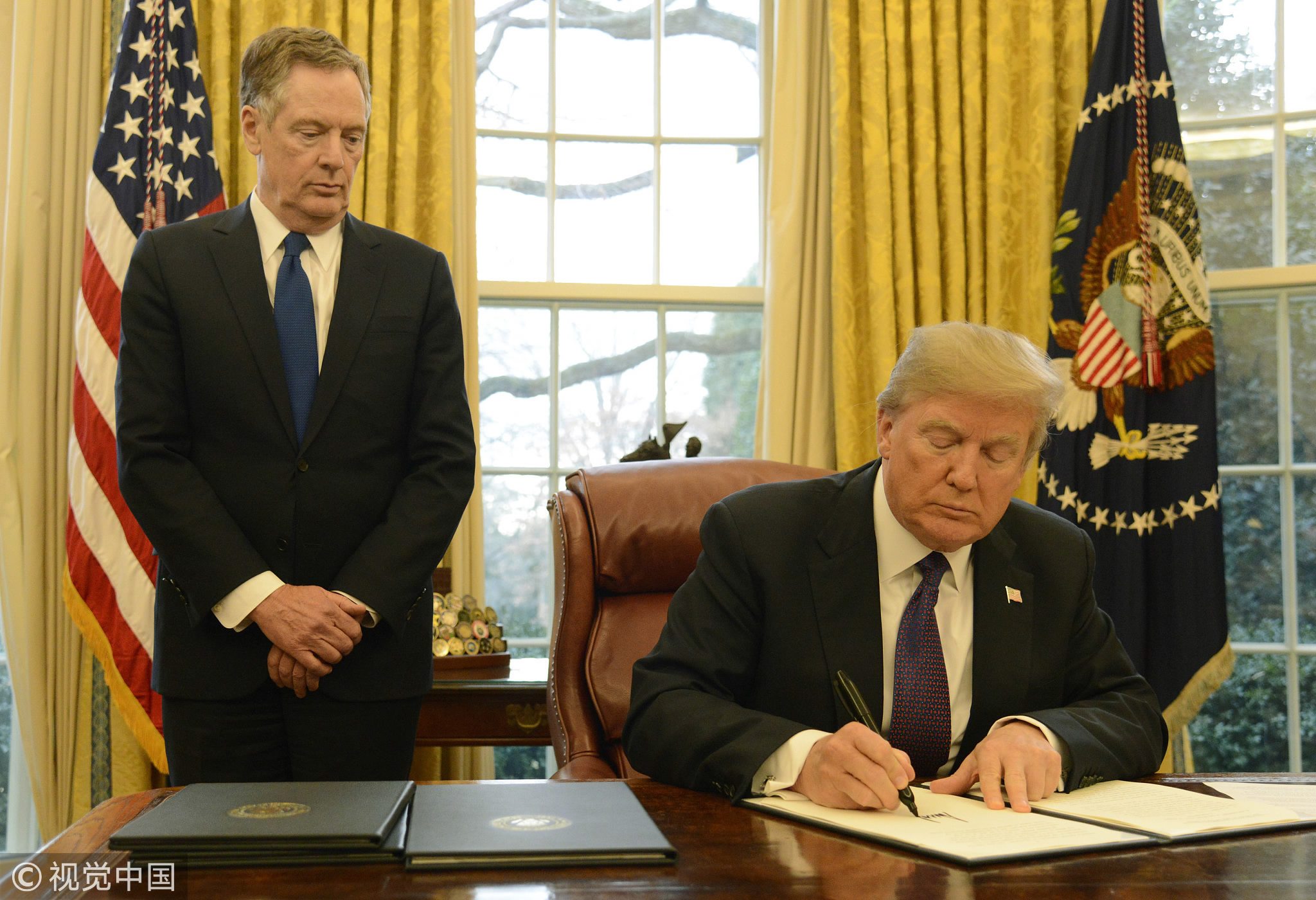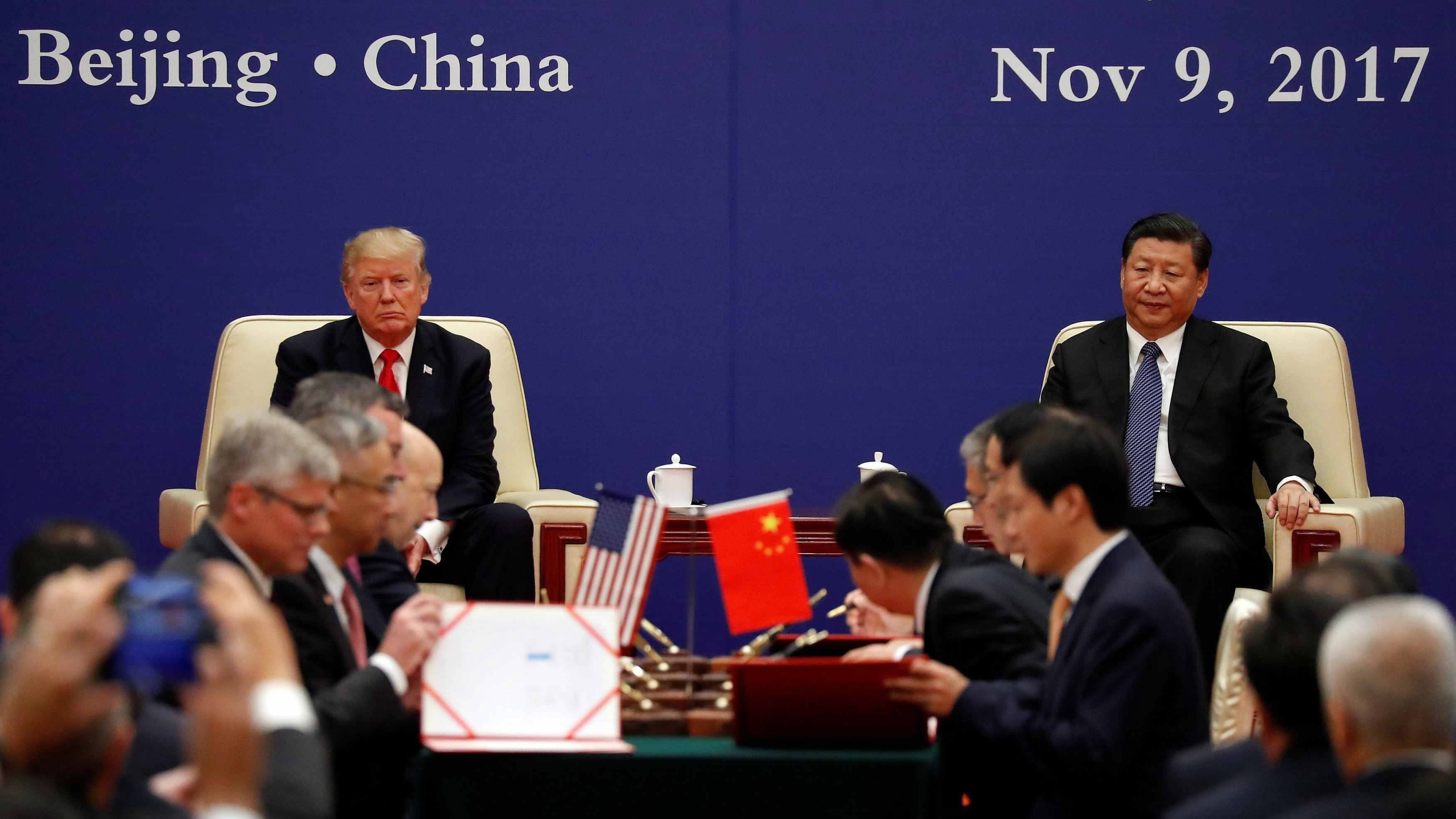
Opinions
13:03, 25-Jan-2018
Opinion: Who is mongering a trade war?
Guest commentary by Li Yong

Just a day before the 48th World Economic Forum (WEF) in Davos, Switzerland, where the world’s leaders are meeting to build consensus on “Creating a Shared Future in a Fractured World”, the theme of the ongoing WEF, the Trump administration announced its decision to slap steep tariffs on the imports of solar cells and washing machines under Section 201 of the Trade Act 1974, which was described as “the first real shot in the global trade war” by ZeroHedage.
The decision by the White House is nothing more than a confirmation that the Trump administration is set to reverse decades of US support for free trade, resorting to protectionist measures as a part of President Donald Trump’s vow “to protect American jobs.”

President
Donald Trump signs a Section 201 action as US Trade Representative Robert
Lighthizer witnesses, in the Oval Office, at the White House, January 23, 2018,
in Washington, DC. /VCG Photo
President Donald Trump signs a Section 201 action as US Trade Representative Robert Lighthizer witnesses, in the Oval Office, at the White House, January 23, 2018, in Washington, DC. /VCG Photo
The so-called "safeguards" under Section 201, which have been rarely used since the Bush administration, given their nature of disrupting the flow of freely and fairly traded goods, have now been “unearthed” as one of the useful unilateral tools to impose restrictions against imports.
China, Germany, Mexico and the Republic of Korea have expressed their disappointment and discontent on the unilateral action taken by the US, which is likely to heighten tensions between the US and its trade partners that could prelude a US-inflicted trade war.
In fact, the Trump administration is aware of the consequences that its protectionist measures would bring about. In an interview with Reuters, when asked if the moves by the US, including the actions against Chinese trade of steel, aluminum and solar panels, could lead to a trade war Trump said, "I don't think so, I hope not, but if there is, there is." This response clearly shows that the White House is not trying to avoid the trade war, but prepared to wage it.
At WEF, which is a forum that champions globalization, global cooperation, global governance and trade liberalization, Trump is going to advance his “America First” agenda, which is out of line with the theme of this session of WEF, adding fractures to the already fractured world.
As US News reported, “not easing tensions, Commerce Secretary Wilbur Ross, accompanying Treasury Secretary Steven Mnuchin (at WEF), said there will "be more to come," and that "US troops were coming to the ramparts" over the possibility of a trade war surrounding the newly imposed tariffs. The commerce secretary also said on the same occasion that trade wars are "fought every single day". Obviously, this is a mongering endeavor rather than an effort to prevent the trade wars from happening.
The tariffs on solar cells and washers may serve as a harbinger for other upcoming trade decisions on the imports of steel and aluminum. The renegotiation of NAFTA may also evolve into a war with the other two NAFTA members, which may culminate in US withdrawal for the pact.
While the slap of tariffs is seen as jeopardizing the multilateral trading system by taking action on complaints under US law instead of through the World Trade Organization, the US trade inhibiting policies under the umbrella of “America First” are widely criticized by the global leaders other than President Trump and his team.

Indian
Prime Minister Narendra Modi gestures as he delivers a speech at the opening
day the World Economic Forum (WEF) 2018 annual meeting, January 23, 2018 in
Davos, eastern Switzerland. /VCG Photo
Indian Prime Minister Narendra Modi gestures as he delivers a speech at the opening day the World Economic Forum (WEF) 2018 annual meeting, January 23, 2018 in Davos, eastern Switzerland. /VCG Photo
In his address at WEF, Indian Prime Minister Narendra Modi denounced the inward looking and isolationist positions taken by some countries, without mentioning the US or Trump. He said, “many societies and countries are becoming more and more focused on themselves. It feels like the opposite of globalization is happening. The negative impact of this kind of mind-set and wrong priorities cannot be considered less dangerous than climate change or terrorism”.
In the case of China, there are more to the adversarial views of trade relations, which is the revived Cold War mentality and extremist politicization. China becomes a name that touches the nerves of American politicians, who would think of ideological differences as justifications of any economic and trade actions, regardless of realities and consequences. National security threats have become a buzz word that sometimes unites the two sides of aisle.

Chinese President Xi Jinping and US President Donald Trump witness the signing of commercial deals in Beijing, November 9, 2017. /Reuters Photo
Chinese President Xi Jinping and US President Donald Trump witness the signing of commercial deals in Beijing, November 9, 2017. /Reuters Photo
China has made great efforts to try to resolve the trade issues with the US, including concessions and compromises made to accommodate the requests from the US, including the opening up of its financial sector announced immediately after President Trump left Beijing with 253 billion US dollar worth of contracts.
Unfortunately, those efforts by China are simply ignored and the Chinese requests have never been seriously given consideration, let alone being fairly treated. The asymmetry in past and recent talks seems to have given the Trump administration an illusion and misconception that China can be bullied in its attack.
Trade war has never been a win-win solution, as evidenced by the lesson of Bush administration’s levy of tariff on steel imports in 2002, which resulted in job losses of 200,000 people and approximately 4 billion US dollar lost in wages.
For those who are mongering, waging and engaging in trade wars, the advice is: don’t be illuded to such things as winning over the other side. It is also a wishful thinking to contain and besiege China by forging alliances with so-called “like-minded” countries. Never do to others what you would not like them to do to you.
(The author is a senior fellow of China Association of International Trade. The article reflects the author's opinion, and not necessarily the view of CGTN.)

SITEMAP
Copyright © 2018 CGTN. Beijing ICP prepared NO.16065310-3
Copyright © 2018 CGTN. Beijing ICP prepared NO.16065310-3